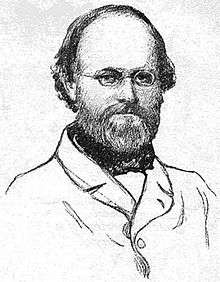Charles Fox Hovey

Charles Fox Hovey (1807–1859) was a businessman in Boston, Massachusetts who established C.F. Hovey and Co., a department store on Summer Street. Through the years Hovey's business partners included Washington Williams, James H. Bryden, Richard C. Greenleaf and John Chandler. In 1947 Jordan Marsh absorbed Hovey's.[1][2][3]
Hovey was also an abolitionist and a supporter of other social reform movements. He was one of a group of Boston businessmen who provided most of the funding for the American Anti-Slavery Society.[4] He also signed the call to the first National Woman's Rights Convention in 1850. Hovey left a bequest of $50,000 to support abolitionism and other types of social reform, including "women's rights, non-resistance, free trade and temperance."[5] The bequest was used to create the Hovey Fund, which provided significant support to social reform movements of that time. It was headed by abolitionist Wendell Phillips.
References
- ↑ Harvard Business School Archived June 22, 2010, at the Wayback Machine.. C.F. Hovey Company, Business Records, 1837-1920.
- ↑ The Hovey Book. 1914; p. 266.
- ↑ Boston Directory. 1849.
- ↑ Abbott (1991) p. 20
- ↑ Dudden (2011), p. 23
- Abbott, Richard. Cotton and Capital: Boston Businessmen and Antislavery Reform, 1854-1868. University of Massachusetts Press, 1991. ISBN 978-0870237492
- Daniel Hovey Association. The Hovey Book: describing the English ancestry and American descendants of Daniel Hovey of Ipswich, Massachusetts. Press of L.R. Hovey, 1914; p. 266+
- Dudden, Faye E. Fighting Chance: The Struggle over Woman Suffrage and Black Suffrage in Reconstruction America. Oxford University Press, New York, 2011. ISBN 978-0-19-977263-6
Further reading
- Tribute to the Memory of Charles F. Hovey, Boston, 1859.
- History of the House of Hovey, containing reminiscences of almost three quarters of a century. Boston: 1920.
Images
-

Interior of C.F. Hovey & Co., Summer Street, Boston, 19th century
-

Exterior of C.F. Hovey & Co., Summer Street, Boston, 19th century
-

Hovey's after the fire, 1872